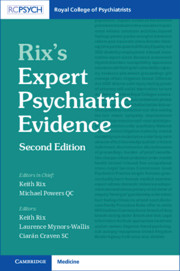Book contents
- Rix’s Expert Psychiatric Evidence
- Reviews
- Rix’s Expert Psychiatric Evidence
- Copyright page
- Contents
- Online Appendices – See Inside Cover for Access
- Contributors
- Foreword to the Second Edition
- Foreword to the First Edition
- Acknowledgements and Preface to the Second Edition
- Acknowledgements and Preface to the First Edition
- Table of Cases
- Table of Statutes and Directives
- Table of Statutory Instruments and Regulations
- Table of Practice Directions
- Table of Codes of Conduct, Guidance, Conventions and Protocols
- Abbreviations
- Chapter 1 The Expert Medical Witness
- Chapter 2 Courts, Laws and Procedures
- Chapter 3 Training, Development and the Maintenance of Expertise
- Chapter 4 Business Matters
- Chapter 5 The Medicolegal Consultation
- Chapter 6 The Report, Amendments, Answers to Questions, Experts’ Meetings and Conferences
- Chapter 7 Reports for Criminal Proceedings and in Prison Cases
- Chapter 8 Reports in Personal Injury Cases
- Chapter 9 Reports for Family Proceedings Relating to Children
- Chapter 10 Reports in Cases Involving Capacity Issues
- Chapter 11 Reports for the First-tier Tribunal (Health, Education and Social Care Chamber) Mental Health
- Chapter 12 Reports in Immigration and Asylum Cases
- Chapter 13 Reports in Employment, Disability Discrimination and Pension Cases
- Chapter 14 Reports for Fitness to Practise, Conduct and Performance Proceedings
- Chapter 15 Reports for Coroners Courts and Fatal Accident Inquiries
- Chapter 16 How to Read an Expert Medical Report
- Chapter 17 Going to Court
- Book part
- References
- Index
- Miscellaneous Endmatter
- References
Chapter 15 - Reports for Coroners Courts and Fatal Accident Inquiries
Published online by Cambridge University Press: 22 January 2021
- Rix’s Expert Psychiatric Evidence
- Reviews
- Rix’s Expert Psychiatric Evidence
- Copyright page
- Contents
- Online Appendices – See Inside Cover for Access
- Contributors
- Foreword to the Second Edition
- Foreword to the First Edition
- Acknowledgements and Preface to the Second Edition
- Acknowledgements and Preface to the First Edition
- Table of Cases
- Table of Statutes and Directives
- Table of Statutory Instruments and Regulations
- Table of Practice Directions
- Table of Codes of Conduct, Guidance, Conventions and Protocols
- Abbreviations
- Chapter 1 The Expert Medical Witness
- Chapter 2 Courts, Laws and Procedures
- Chapter 3 Training, Development and the Maintenance of Expertise
- Chapter 4 Business Matters
- Chapter 5 The Medicolegal Consultation
- Chapter 6 The Report, Amendments, Answers to Questions, Experts’ Meetings and Conferences
- Chapter 7 Reports for Criminal Proceedings and in Prison Cases
- Chapter 8 Reports in Personal Injury Cases
- Chapter 9 Reports for Family Proceedings Relating to Children
- Chapter 10 Reports in Cases Involving Capacity Issues
- Chapter 11 Reports for the First-tier Tribunal (Health, Education and Social Care Chamber) Mental Health
- Chapter 12 Reports in Immigration and Asylum Cases
- Chapter 13 Reports in Employment, Disability Discrimination and Pension Cases
- Chapter 14 Reports for Fitness to Practise, Conduct and Performance Proceedings
- Chapter 15 Reports for Coroners Courts and Fatal Accident Inquiries
- Chapter 16 How to Read an Expert Medical Report
- Chapter 17 Going to Court
- Book part
- References
- Index
- Miscellaneous Endmatter
- References
Summary
The role of the coroner has evolved since the office was formally established in 1194, from being a form of medieval tax gatherer to an independent judicial office holder charged with the investigation of sudden, violent or unnatural death. A coroner in England and Wales is appointed, but not employed, by the local authority and now has to have had a minimum of five years’ legal experience. In Ireland, a barrister, solicitor or registered medical practitioner who has practised as such for not less than five years is eligible for appointment.
- Type
- Chapter
- Information
- Rix's Expert Psychiatric Evidence , pp. 277 - 282Publisher: Cambridge University PressPrint publication year: 2020

